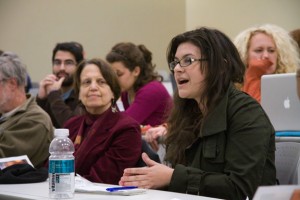Seniors Brian Potter, Shiwani Neupane, and Elissa Snook and sophomore Evan Johnson aired their short film about news reporting in the Gaza War and Operation Cast Lead as part of their Politics Seminar at 8 p.m. Monday in Room 111 of the Ithaca College School of Business.

About 80 people attended the 30-minute screening of the short film “Unveiling the War in Gaza,” which took a closer look at media coverage of Israel’s open attack on the Gaza Strip in 2009, known as Operation Cast Lead, and the Palestinian civilian casualties it resulted in. The film did not take a position on whether Israel was justified in attacking buildings in Hamas, the Islamic Resistance Movement, but presented that this was an issue most American TV networks overlooked.
“We originally chose this topic because we were shocked by the amount of deaths and how the U.S. news media didn’t cover it fully,” Snook said. “It was something we didn’t know much about ourselves, and it became as much of a learning experience for us as we tried to explain Operation Cast Lead.”
The film contained actual news coverage from around the world about Operation Cast Lead and incorporated original interviews with professional reporters from the London Times and The Guardian.
Sheera Frenkel of the London Times was featured talking about her experience sneaking into Gaza to witness the conflict firsthand. Ben White of The Guardian gave his opinion on the U.S. slanting news coverage based on where its alliances are at the present moment.
Neupane said she interviewed independent, non-U.S. voices because these sources would present a more objective point of view.
“Different sides have different stories, so it’s up to the person reporting to explore these aspects,” Neupane said. “We feel foreign media tends to be best at reporting unbiasedly in cases like these.”
Photos of the destruction were presented in a slideshow that emphasized the number of children killed or wounded in the attack. Snook said infant casualties from the Gaza attacks were one of the reasons they selected Operation Cast Lead as the topic for their project.
“Children are the most innocent bystanders, and we felt that the news didn’t cover enough about those deaths on either side.” Snook said.
The students were questioned by members of the audience about whether they were being objective by accompanying photos of mutilated children with music.
Senior Vincent Fiamm, who attended the screening, said he felt the film was well-balanced in showcasing the difficulty in reporting objectively in this day and age.
“They weren’t talking about who was right,” Fiamm said. “It was more interesting in that they were strictly showing different sides of the issue. They did a good job in presenting how it’s difficult to cinch out what’s correct and what isn’t in the media.”
The audience debated whether or not the Israeli attack on the Gaza Strip was an act of terrorism during a question and answer session after the screening. Most of the questions were directed toward the Israeli-Palestinian conflict rather than the film itself. Discussions between audience members ranged from the foundation of Israel in 1948 to the idea of people living in Israel being unaware of the facts at hand.
Potter said debate about the conflict was to be expected but that the dialogue among students went well and was an informative session.
“There was a lot of good, constructed discussion from both sides,” Potter said. “It’s great that we were able to allow students to share opinions in an open forum.”
Fred Wilcox, associate professor of writing who attended the event, said both the film and the dialogue were fair, and these debates are part of what makes Ithaca College a healthy environment.
“This is calm compared to other meetings I’ve seen,” Wilcox said. “There’s obviously going to be some arguing on this issue, but I see nothing wrong with that. I encourage students to challenge anyone and anything, including me.”







